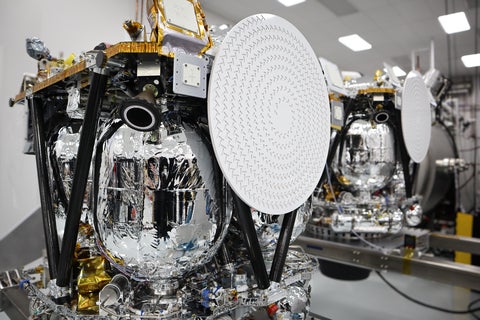Latest News
Rocket Lab Completes ESCAPADE Spacecraft Testing, Ready to Ship for Mars Launch Later This Year

The University of California Berkeley’s Space Science Laboratory and NASA’s ESCAPADE spacecraft. (Photo: Rocket Lab)
Global launch services company Rocket Lab USA confirmed Monday that it completed integration and testing of two spacecraft it built for The University of California Berkeley’s Space Science Laboratory and NASA. The “Escape and Plasma Acceleration and Dynamics Explorers (ESCAPADE)” mission spacecraft will be shipped to Cape Canaveral in August, where they will be integrated onto Blue Origin’s New Glenn rocket and then launched to orbit around Mars.
ESCAPADE’s heliophysics mission aims to measure plasma and magnetic fields around Mars, helping scientists from NASA and University of California learn more about the processes that strip away atoms from the planet’s magnetosphere and upper atmosphere, driving Martian climate evolution.
The spacecraft, nicknamed “Blue” and “Gold,” were built based on Rocket Lab’s configurable, high delta-V interplanetary platform “Explorer,” and then tested at the company’s Spacecraft Production Complex and headquarters in Long Beach, California. The two spacecraft feature Rocket Lab-built components and subsystems, including solar panels, star trackers, propellant tanks, reaction wheels, reaction control systems, radios, and more.
“Rocket Lab has been an invaluable partner to UC Berkeley over the last four years of ESCAPADE’s development,” said ESCAPADE Principal Investigator and Associate Director for Planetary Science at the UC Berkeley Space Sciences Laboratory, Rob Lillis. “Their energetic, talented engineers and managers have consistently gone above and beyond in responding rapidly and constructively to both our requests and the inevitable challenges inherent in developing new scientific spacecraft. We are proud to be flying with Rocket Lab to Mars.”
Get the latest Via Satellite news!
Subscribe Now